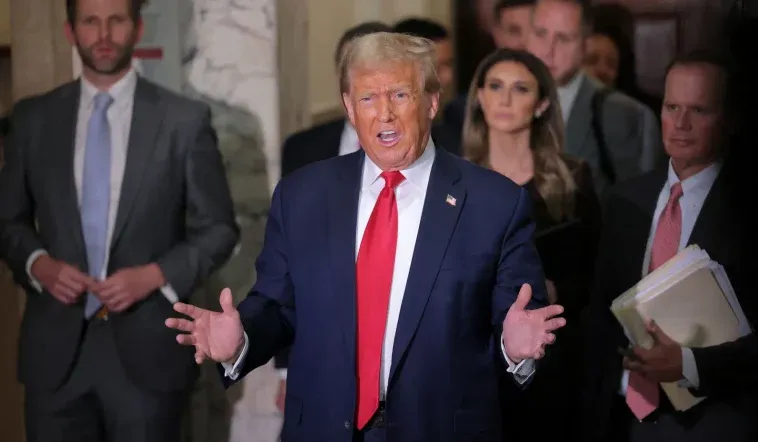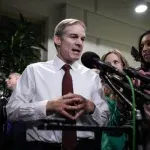(National Review) As if trying to prove Donald Trump’s point that her bias against him should disqualify her from presiding over a criminal case against him, Judge Tanya Chutkan has imposed a limited gag order on the former president and current presidential candidate, forbidding him from further abominations of the prosecutor, court personnel, or likely witnesses. It is the second gag order issued against Trump in two weeks — Judge Arthur Engoron having imposed one in the ongoing New York State civil fraud trial after Trump claimed that the judge’s law clerk was the girlfriend of Chuck Schumer, the U.S. Senate’s top Democrat (and Trump nemesis).
Judge Chutkan is the Obama appointee to the federal district court in Washington, D.C., who is assigned to the 2020 election-tampering casebrought by Jack Smith, the Biden Justice Department special counsel. Like a good Democrat, Chutkan has publicly adhered to the narrative that Trump directed the violence at the Capitol on January 6, even though he has never been charged with incitement or any other crime of violence — not because the Biden Justice Department hasn’t been trying, but because it lacks evidence. And consistent with this Democratic narrative, in imposing the limited gag order in an oral ruling from the bench on Monday, Chutkan accepted the prosecutors’ contention that Trump is “encouraging violence” by his publicly inveighing that, for example, the case is “rigged,” Smith is “deranged,” Chutkan is a “radical Obama hack,” and “if you go after me, I’m coming after you” — even though, again, Smith has not charged Trump, nor could he credibly, with incitement or obstruction of justice based on anything Trump has said or done.
As I’ve repeatedly observed, Trump is morally and politically responsible for creating the conditions that led to the Capitol riot. He should have been impeached, removed, and disqualified over his post-2020-election conduct. That, however, does not render him criminally culpable for the riot, nor does it justify curtailing his First Amendment protections.
Trump’s ongoing commentary about the prosecution is reminiscent of his Ellipse speech immediately prior to the uprising at the Capitol: unhinged and offensive. But even as we were rightly repulsed by the Ellipse speech, we recognized that he had a constitutional right to give it. Similarly, he has a right to contend — however appalling his word choices — that he is being subjected to a politicized prosecution by his partisan opponents, who are abetted by a biased judge. He’d have that right even if he wasn’t a political candidate; the fact that he is one heightens the court’s duty to minimize the intrusion of judicial process on the electoral process — a duty to which Chutkan is impervious.
Smith has sought the order restricting Trump’s free-speech rights while Trump is the likely Republican nominee in the presidential race and while his opponents, Republican and Democrat, are under no restrictions regarding what they may say about the prosecutions against him. Smith, moreover, strategically timed the indictment and pressed for a speedy trial over defense objections in order to ensure that the trial takes place during the 2024-election campaign — a strategy he has also employed in the separate indictment he brought against Trump in Florida.
With Judge Chutkan as the wind at his back, Smith contends that the “administration of justice” is the ne plus ultra of public interests. By their lights, the judicial process need neither cede ground to nor make accommodations for any other constitutional concern — even the robust political speech that the First Amendment guarantees in campaigns for the nation’s highest office.
This imperial “administration of justice” is justice for the government, not the accused — a warping of the constitutional order in which the judiciary is supposed enforce due process in order to protect the accused from potential abuses of executive power. Ergo, the Smith/Chutkan theory holds that the government has a right to a speedy trial, even though (1) the Constitution provides that safeguard only to an accused, who in this case has waived it, and (2) in reality, it is not the government but the Democratic Party that has an interest in a speedy trial — i.e., one that ties its main political opponent up in court and generates negative publicity for him during key junctures of the campaign. If the chief concern were due process rather than electoral politics, the Justice Department and the court would not be prejudiced in the slightest if Trump’s trial were postponed until after the November 5, 2024, election. If that happened, Trump’s free-speech and fair-trial rights would be protected with no harm to the administration of justice.
My point here is not to endorse Trump’s unseemly rhetoric but rather to recognize that the Constitution permits offensive speech. Significantly, our law’s presumption against prior restraints is not a shield against the consequences of repellent rhetoric. If Trump’s comments rise to the level of incitement or libel, he can and should be criminally prosecuted or civilly sued. If his comments are provably false or if they shed light on his knowledge, intent, and motivation with respect to the crimes charged, they may be used against him by the prosecution. If Trump’s remarks continue to evince a lack of contrition for his heedlessness and a lack of regard for the rule of law, the court is certain to take that into account in imposing sentence if he is convicted at trial.
But all that said, as long as Trump’s remarks do not violate the law, the judge has no business telling him — as he campaigns, and as his unencumbered opponents make an issue of the indictments against him — that he can’t talk publicly about the court, the prosecutors, and the witnesses.
According to Chutkan, Trump’s tirades against the court, the prosecutors, and such likely witnesses as former vice president Mike Pence (whose own 2024 presidential campaign features speeches about how he faced down the pressure Trump put on him to violate the Constitution) could undermine the administration of justice. Even if there were no other ways besides constitutionally fraught restrictions on speech to address the situation, Chutkan’s expressed concerns are dubious. Even on the rushed schedule Smith and Chutkan have imposed over defense objections, the trial is still five months away. Obviously, no jury has yet been selected. And the suggestion that Trump’s commentary may have a material effect on the pool from which the jury will be selected is unpersuasive — Trump and his penchant for noxious rhetoric are well known and widely detested in Washington, D.C., as is his insistence that he can’t get a fair trial there. Regardless of whether Trump never said another word about the case or talked nonstop about it, the Washington jury pool’s assessment of Trump (after his four-year presidency there) is fixed. And it’s not as if muzzling Trump is going to reduce pre-trial publicity about the case.






